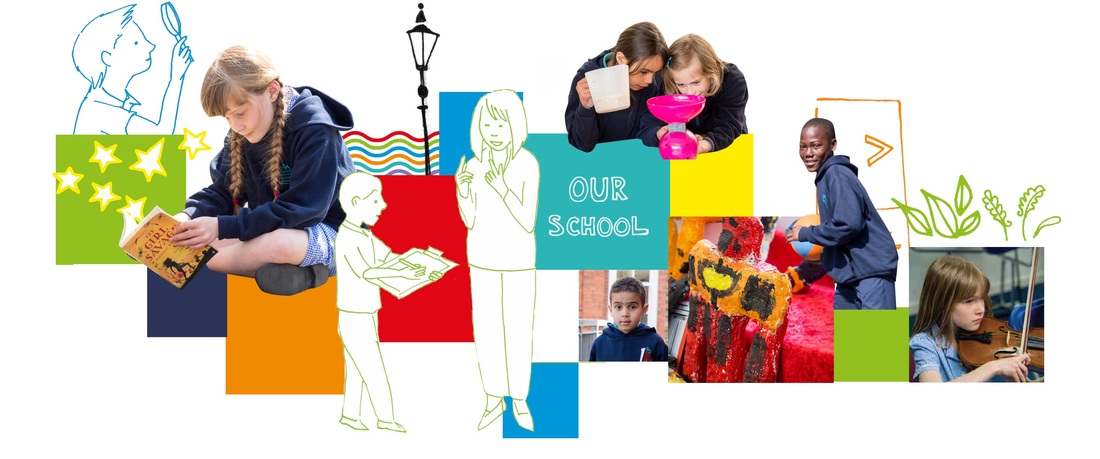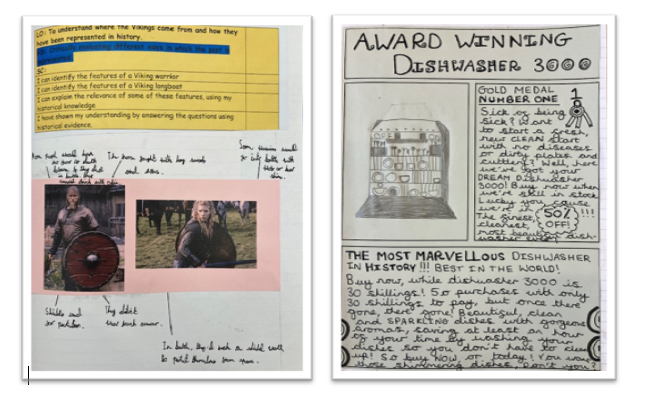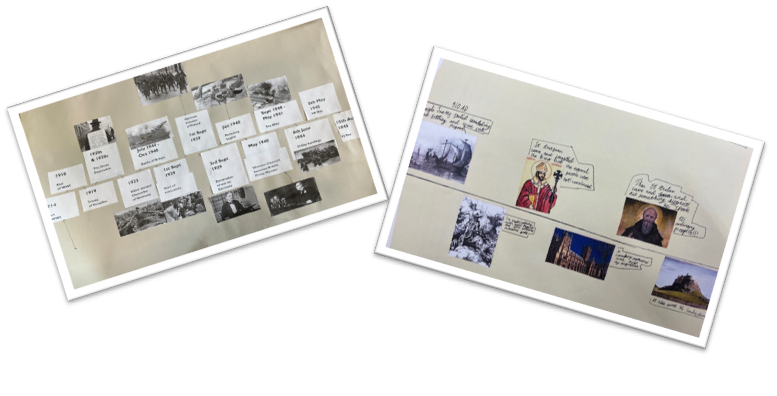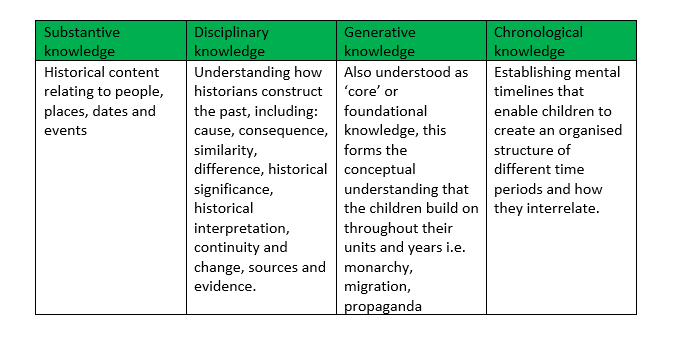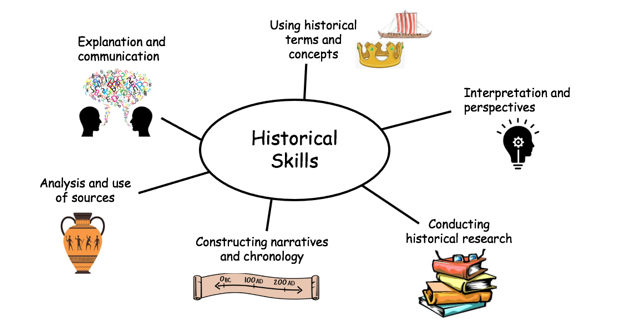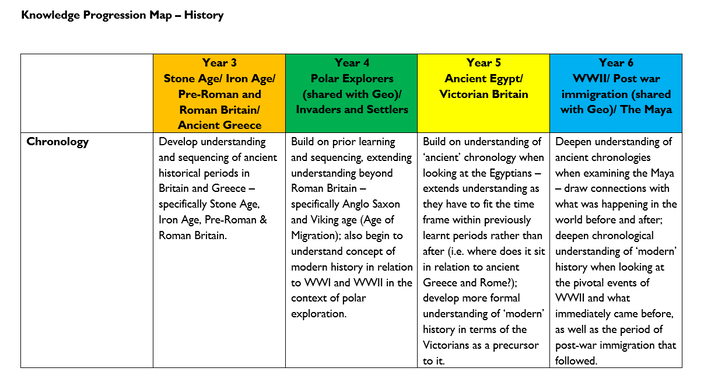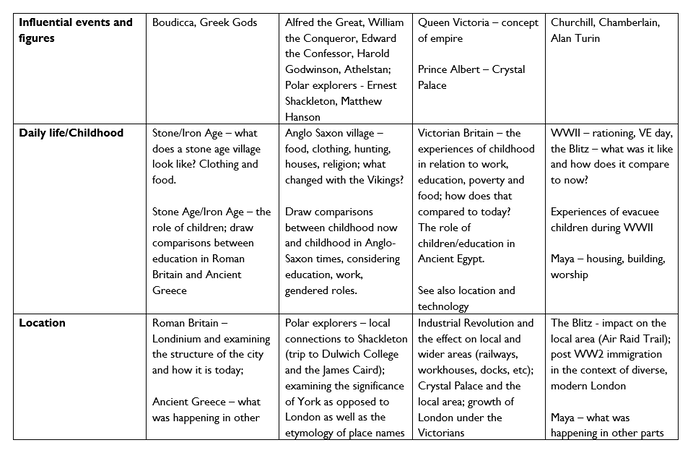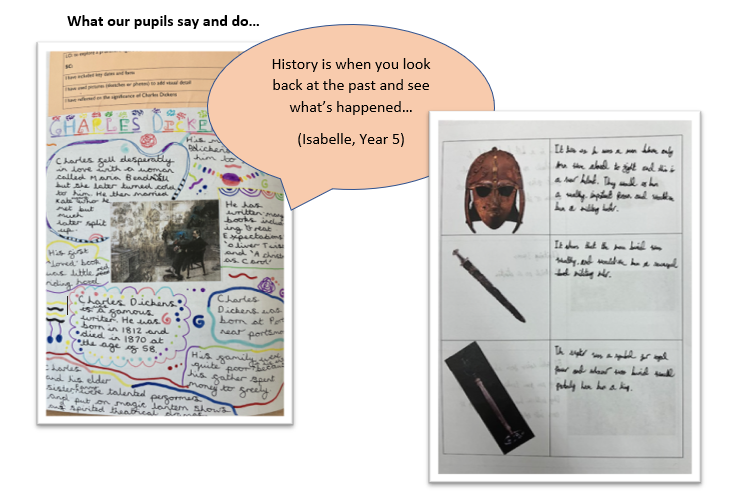Our Curriculum | English | Mathematics |
Science | PSHE | Music | PE | Art | RE | MFL | D&T | Geography | History | Computing | Extra-Curricular |
Science | PSHE | Music | PE | Art | RE | MFL | D&T | Geography | History | Computing | Extra-Curricular |
HISTORY
Our history curriculum fosters children’s understanding and curiosity of the world in which they live and its rootedness within the past. By exploring connections, continuity and change across time and place, we aim to not only embed historical skills and knowledge in our children, but to provide context to their growing identities and social attitudes.
History at the Hamlet is linked to the school vision: Outstanding learning within a glittering curriculum where everyone matters.
Outstanding learning: Our History curriculum covers all aspects of the KS2 national curriculum (2014), including non-statutory guidance, and routinely takes into consideration evidence-based research that enhances the personal growth and academic development of our children.
Glittering curriculum: Our in-class teaching is complimented by a range of opportunities for wider engagement and bringing the children’s learning of history ‘to life’. These include whole year group trips outside of London, investigations of the local area, re-enactments and drama opportunities, visitors, workshops and specific celebration days, such as ‘Ancient Greece’, ‘Ancient Egypt’ and ‘Anglo Saxon’ days.
Everyone matters: History is crucial in helping children to understand where they come from and who they want to be, both as individuals and as a society. Equality, diversity and inclusion are reflected throughout our history programme to ensure that children not only see themselves in history but, by critically evaluating the events and attitudes of the past, develop a sense of moral character and an open understanding and acceptance of others.
Outstanding learning: Our History curriculum covers all aspects of the KS2 national curriculum (2014), including non-statutory guidance, and routinely takes into consideration evidence-based research that enhances the personal growth and academic development of our children.
Glittering curriculum: Our in-class teaching is complimented by a range of opportunities for wider engagement and bringing the children’s learning of history ‘to life’. These include whole year group trips outside of London, investigations of the local area, re-enactments and drama opportunities, visitors, workshops and specific celebration days, such as ‘Ancient Greece’, ‘Ancient Egypt’ and ‘Anglo Saxon’ days.
Everyone matters: History is crucial in helping children to understand where they come from and who they want to be, both as individuals and as a society. Equality, diversity and inclusion are reflected throughout our history programme to ensure that children not only see themselves in history but, by critically evaluating the events and attitudes of the past, develop a sense of moral character and an open understanding and acceptance of others.
What History looks like at The Hamlet
Vocabulary is explicitly taught throughout our History units; this enables children to access new concepts as well as build on and develop these over their time at school. Unit designs follow four main thematic strands to ensure consistency across year groups as well as anchoring the means for children to expand their generative, disciplinary and substantive knowledge (see Knowledge). These strands consist of:
Vocabulary is explicitly taught throughout our History units; this enables children to access new concepts as well as build on and develop these over their time at school. Unit designs follow four main thematic strands to ensure consistency across year groups as well as anchoring the means for children to expand their generative, disciplinary and substantive knowledge (see Knowledge). These strands consist of:
- Influential events and figures
- Technology
- Childhood and Daily life
- Locality
Knowledge
In order to successfully develop our children into young historians, teaching needs to impart key content alongside the lens through which it is constructed, organised and interpreted. As such, our practice distinguishes between specific knowledge strands which are interwoven throughout the learning. These are as follows:
In order to successfully develop our children into young historians, teaching needs to impart key content alongside the lens through which it is constructed, organised and interpreted. As such, our practice distinguishes between specific knowledge strands which are interwoven throughout the learning. These are as follows:
Skills
History at the Hamlet encourages the explicit teaching of skills. We believe that in doing this, children’s metacognitive processes are supported, allowing them to successfully transition to KS3 as self-aware, articulate learners and problem solvers.
History at the Hamlet encourages the explicit teaching of skills. We believe that in doing this, children’s metacognitive processes are supported, allowing them to successfully transition to KS3 as self-aware, articulate learners and problem solvers.
Provision Map
After the Hamlet
By the time our children leave the Hamlet, they should have a solid understanding of key historical skills and a foundation for enquiry. They should have a firm grasp of the differences between primary and secondary sources and be able to discuss the reliability and strengths of each. They should have a bourgeoning appreciation of contestability, founded on an understanding of key terms such as ‘bias’ and that history is comprised of a variety of perspectives. They should have a bank of key vocabulary and historical concepts to build upon as they transition into KS3 learning as well as a broad knowledge of key periods across time and location to build upon. More broadly, they will have an appreciation for the experiences of the past, allowing them to move into the world as empathetic, informed and considerate members of society.
By the time our children leave the Hamlet, they should have a solid understanding of key historical skills and a foundation for enquiry. They should have a firm grasp of the differences between primary and secondary sources and be able to discuss the reliability and strengths of each. They should have a bourgeoning appreciation of contestability, founded on an understanding of key terms such as ‘bias’ and that history is comprised of a variety of perspectives. They should have a bank of key vocabulary and historical concepts to build upon as they transition into KS3 learning as well as a broad knowledge of key periods across time and location to build upon. More broadly, they will have an appreciation for the experiences of the past, allowing them to move into the world as empathetic, informed and considerate members of society.

